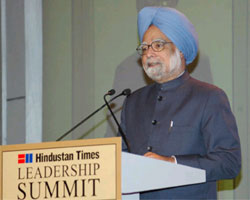|
Poor countries should not pay for the "profligacy" of rich nations, prime minister Manmohan Singh said even as he vowed to use every fiscal and monetary tool to fend off the impact of the global financial crisis on the country. He said the meeting of the Group of 20 countries last week gave developing nations the kind of platform they sought but more work was needed to tackle the severe global downturn.  Addressing the Hindustan Times Leadership summit, the prime minister said the Indian economy is strong enough to weather the global economic downturn and sustain an eight per cent growth rate, ''despite the adverse international environment." Addressing the Hindustan Times Leadership summit, the prime minister said the Indian economy is strong enough to weather the global economic downturn and sustain an eight per cent growth rate, ''despite the adverse international environment."
India, Asia's third-largest economy, expanded by around nine per cent for the past three years. He said global institutions must be made more representative of developing nations in today's interdependent world and the G-20 summit meeting in Washington was a step forward. "So, I would say that there is a ray of hope that the leaders who matter have sat together, talked constructively, have come out with an outcome which should inspire confidence of the markets," the prime minister said, adding, "Much work remains to be done.'' ''There are still many uncertainties about the depths of the recession, its possible length. So it will test everyone but a hopeful beginning has been made to tackle this problem," he said. Detailing his vision for India, he said, ''Nowhere else in the world you find a billion plus people trying to transform their economy and the society in the framework of the functioning democracy committed to full respect for fundamental human freedoms and respect for the rule of law. I had said also then that the ''idea of unity in diversity'', and the great Indian philosophical tradition that inspired it, remain our great inheritance that we would like the entire world to embrace.'' ''The notion of cooperative pluralism and respect for diversity that is the basis of our democracy must also be the basis of global governance in the 21st century if it is to inspire universal trust and confidence,'' he said. ''People everywhere seek well-being and sustainable livelihoods, but they also seek fundamental freedoms. People do want jobs, people want education, people want housing and health care. But people also want to live in open societies and open economies. People throughout history has sought freedom from tyranny in all its manifestations. They wish to be governed by the rule of law. This has been the human endeavour in the past and I suggest to this august audience that it will remain so in the years to come,'' the prime minister said. But, he said India's success would depend on how it manages to rid its people of chronic poverty, ignorance and disease within the framework of a democratic polity. The success of this Indian experiment will remain not just our national ambition for the new century. It will also be the global ambition, he said. ''My greatest ambition for the coming century or the present century is to see a fully educated and empowered India. The light of knowledge must touch every child, male or female and empower every one of our citizens. I have this dream for our people because that was my dream as a young boy in a distant village in the erstwhile state of Punjab. I stand before you today because the light of knowledge has empowered me. I cannot think of any other reason. Like millions of Indians I come from a family of modest means. I lived in a dusty village with no doctor around, no school, no electricity, no paved roads, no safe drinking water facility.'' He cited his own example to show how scholarships and fair selection would help individuals in a free society advance in life and realise one's dreams. Our challenges and our tasks present themselves to us everyday. It is up to us to exert pressure on our system to deliver results. We must improve the quality of our processes of governance, we must improve the quality of our educational system. We must improve the public delivery system, especially in health care, sanitation, drinking water, education and public transport. We must build a more efficient and competitive society. We must learn to respect the spirit of adventure and enterprise in our entrepreneurs. We must provide an even better environment for individual enterprise to flower and to flourish. These have been the focus of the government's policies these four and a half years, he said. The world, he said, has become more integrated and inter-dependent. In both good and bad, in prosperity and peril, in opportunity and crisis we must recognise the new inter-dependencies of nations and no nation is an island into itself. That is why at the recent G-20 Summit last week I urged world leaders to recognise these inter-dependencies and our stake in our collective future. ''We need a global safety net so that the poor of the world do not pay a price for the profligacy of the rich, and the delinquency of a few. Global problems require global solutions. This is the most important lesson of the past century for the present century. But global institutions of governance must be made more inclusive and more representative. The voice of the developing world must be heard in the high councils of global decision-making,'' he said. Let no prejudice from the past shape, nor a hurdle in the present thwart our ambitions for the future, he said.
|